China-aided project transforms lives of over 6,000 cataract patients in Cambodia
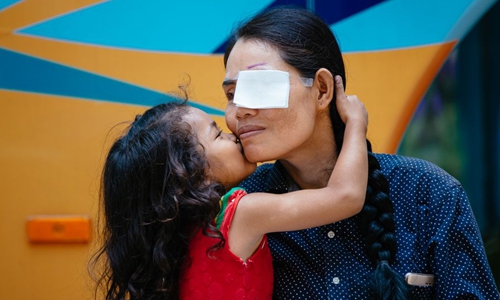
A patient receives a kiss from her daughter before a cataract surgery at Kampong Cham Provincial Hospital in Kampong Cham, Cambodia, March 15, 2019. (Xinhua/Zhu Wei)
Sam Him, a 78-year-old farmer in Cambodia's Kampon Cham province, used to be in blindness because of cataracts in his eyes and could not even walk normally without the company of a family member. His life changed last year after Chinese doctors removed the cataracts and restored his vision.
"Now, my both eyes can see clearly, see even small ants. I'm very happy and satisfied with my life," he told Xinhua on Tuesday.
"I'd like to thank the Chinese medical team for helping restore sight for Cambodian patients... they have brought me new hope, and I will never forget their kindness," he said.
Sam Him was one of the over 6,000 patients helped by the 19-month China-aided Belt and Road Cataract Blindness Eradication Campaign, which came to an end on Tuesday.
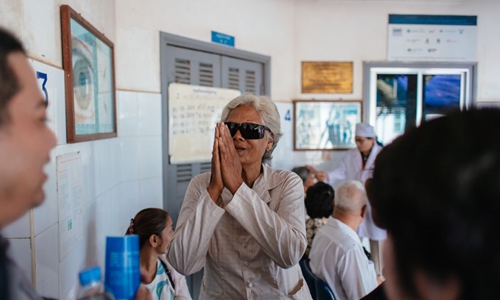
A patient who received a cataract surgery expresses thankfulness to doctors at Kampong Cham Provincial Hospital in Kampong Cham, Cambodia, March 16, 2019. (Xinhua/Zhu Wei)
The closing ceremony of the project at the Kampong Cham Provincial Health Department was attended by about 800 people, including government officials, local authorities, health officials, recovered cataract patients and students.
In his speech, Cambodian Deputy Prime Minister Yim Chhay Ly expressed his profound gratitude to the government and people of China for funding the project and to the Chinese medical team for providing free checkups and surgeries for Cambodian cataract patients.
"This project has brought big benefits to patients and their families," he said. "It has importantly contributed to relieving hardship for cataract patients in Cambodia."
He said the successful completion of the project is a new testament to closer friendship and cooperation between the two countries and peoples.
The campaign, launched in Cambodia in May 2018 by Chinese entities and with cooperation of the Cambodian Ministry of Health, offered a 19-month free surgery for all cataract patients in Kampong Cham province.
Under the campaign, China sent a group of ophthalmologists, along with two large vehicles equipped with modern medical equipment, to the Kampong Cham Provincial Hospital for cataract surgeries.
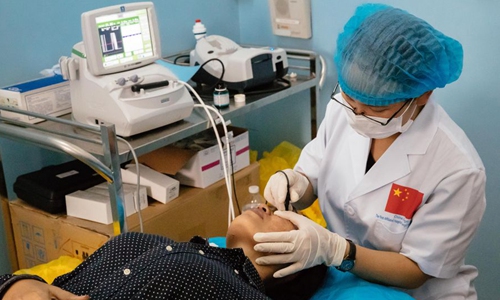
Liao Shaoyan (R), a nurse of the First Affiliated Hospital of Guangxi Medical University, conducts pre-operative check-ups for a patient ahead of a cataract surgery at Kampong Cham Provincial Hospital in Kampong Cham, Cambodia, March 15, 2019. (Xinhua/Zhu Wei)
Leung Chun-ying, vice chairman of the National Committee of the Chinese People's Political Consultative Conference and chairman of the Belt and Road Hong Kong Center, said that the project has truly demonstrated the spirit of international cooperation and people-to-people connectivity.
"Restoring eyesight to over 6,000 patients in one campaign is an outstanding achievement," he said. "Each and every patient has a touching and heart-warming story to tell. As a result of this campaign, the friendship between the peoples of China and Cambodia is stronger."
Apart from helping cataract patients to regain their vision, local ophthalmologists were also trained to perform cataract surgery independently, said a project's report, adding that all nurses at the hospital are now well-versed in the pre-and-post operation procedures and eye care for patients.
Chinese Ambassador Wang Wentian said such a project was vital to helping reduce poverty and deepening people-to-people bonds between the two countries.
"The project has not only provided new hope to cataract patients in Kampong Cham province, but also contributed to further promoting China-Cambodia relations under the framework of the Belt and Road Initiative," he said.
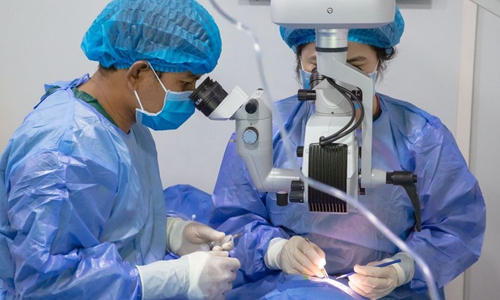
Doctor Liang Hao (R) of the First Affiliated Hospital of Guangxi Medical University conducts a cataract surgery for a patient at Kampong Cham Provincial Hospital in Kampong Cham, Cambodia, March 15, 2019. (Xinhua/Zhu Wei)
PROJECT BRINGS HOPE TO PATIENTS
Cambodian Minister of Health Mam Bunheng said under the project, China donated two mobile eye treatment centers worth about 900,000 U.S. dollars to the hospital for cataract surgeries.
"During the project, the Chinese medical team had helped more than 6,000 Cambodian cataract patients restore their eyesight," he said. "They have brought smiles and happiness to the patients and their family members."
Por Norin, head of the ophthalmology unit of the Kampong Cham Provincial Hospital, said the project greatly benefited cataract patients in the province.
"It helps a lot because during the past 19 months, the surgeries were made free of cost," he told Xinhua. "If charged, the lowest fee for a surgery on one eye is between 300 U.S. dollars and 400 dollars."
"Until now, 6,208 patients had their cataracts removed. If calculated this figure into cash, it is a great amount," he said.
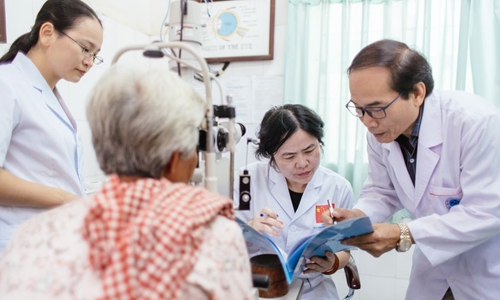
Doctor Liang Hao (2nd R) of the First Affiliated Hospital of Guangxi Medical University, Liao Shaoyan (1st L), a nurse of the First Affiliated Hospital of Guangxi Medical University, and Por Norin (1st R), head of the ophthalmology unit of the Kampong Cham Provincial Hospital, conduct a post-operative check for a patient at Kampong Cham Provincial Hospital in Kampong Cham, Cambodia, March 16, 2019. (Xinhua/Zhu Wei)
Norin said during the project, Cambodian doctors and nurses had learned a lot from their Chinese counterparts and they are now able to use medical equipment and materials on the eye mobile treatment centers to operate on cataract patients independently.
"We'd like to express our sincere and heartfelt thanks to the Chinese government for sending Chinese medical teams, materials, and equipment to help our people," he said.
Zeng Siming, an ophthalmologist and the leader of the Chinese medical team for the project, said he was very proud to have helped Cambodian cataract patients restore their vision, and hoped that through this humanitarian work, the people-to-people relations would be further deepened.
A cataract is a condition where the natural lens in a person's eye grows opaque. There are various things that can cause cataracts including an injury to the eye or too much exposure to bright sunlight.
In Cambodia, cataracts are the main cause of blindness. According to a national estimate, about 0.32 percent of the country's 16 million people have cataracts.
The next cataract blindness elimination project will be carried out in southeastern Prey Veng province, according to Leung.